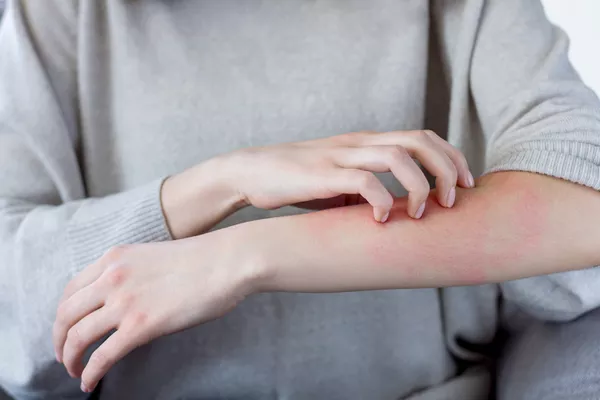Psoriasis, a chronic autoimmune condition characterized by rapid skin cell growth resulting in red, scaly patches, affects millions worldwide. While the exact cause of psoriasis remains unclear, researchers have uncovered potential connections between alcohol consumption and the severity of psoriasis symptoms. In this article, we delve into the relationship between alcohol and psoriasis, examining how alcohol affects this skin condition and exploring strategies for managing symptoms.
What is Psoriasis?
Before we explore the impact of alcohol on psoriasis, let’s first understand the basics of this condition. Psoriasis is a non-contagious skin disorder that speeds up the life cycle of skin cells, causing cells to build up rapidly on the surface of the skin. This excess cell buildup forms thick, silvery scales and itchy, dry, red patches that can be painful and may crack and bleed.
Psoriasis is considered an autoimmune disease where the immune system mistakenly attacks healthy skin cells. It can appear anywhere on the body but often affects the scalp, elbows, knees, and lower back. The severity of psoriasis varies widely among individuals, with some experiencing mild, localized symptoms and others enduring more extensive flare-ups that significantly impact their quality of life.
The Role of Alcohol in Psoriasis
While the precise triggers for psoriasis flare-ups can differ from person to person, emerging evidence suggests that alcohol consumption may exacerbate psoriasis symptoms. Several studies have explored this connection, highlighting potential mechanisms through which alcohol affects the immune system and skin health.
Inflammatory Response and Immune System
Alcohol consumption is known to trigger inflammation in the body. Chronic inflammation is a key driver of autoimmune conditions like psoriasis. The inflammatory response associated with excessive alcohol intake can disrupt the immune system, potentially worsening psoriasis symptoms. Research indicates that alcohol can interfere with immune cell function, leading to increased inflammation and contributing to the development of autoimmune disorders.
Impact on Skin Health
Alcohol can also directly affect the skin’s barrier function and hydration levels. Excessive alcohol consumption can dehydrate the body, leading to dry, flaky skin—common characteristics of psoriasis. Moreover, alcohol’s impact on blood vessel dilation and circulation may affect skin health and exacerbate psoriasis symptoms. Alcohol-induced vasodilation (widening of blood vessels) can trigger flushing and redness, which may aggravate psoriatic lesions.
Alcohol Consumption and Psoriasis Severity
Studies exploring the relationship between alcohol intake and psoriasis severity have yielded mixed findings. While some research suggests a correlation between alcohol consumption and increased psoriasis severity, other studies have found no significant association. Factors such as the amount and frequency of alcohol consumption, individual genetics, and lifestyle habits likely play a role in determining how alcohol impacts psoriasis symptoms.
Types of Alcohol and Psoriasis
Not all alcoholic beverages affect psoriasis equally. Some individuals report that certain types of alcohol trigger flare-ups more than others. Beer, for example, contains gluten and may worsen symptoms in people with gluten sensitivities or celiac disease, which are conditions that commonly coexist with psoriasis. Additionally, sugary cocktails and mixers can contribute to inflammation and may negatively impact skin health.
Alcohol and Treatment Response
Beyond influencing the onset and severity of psoriasis symptoms, alcohol consumption can affect the efficacy of psoriasis treatments. Certain medications prescribed for psoriasis, such as methotrexate, can interact negatively with alcohol. Methotrexate, a common oral medication used to manage psoriasis, can strain the liver. Concurrent alcohol consumption can compound this strain, potentially leading to liver damage and reducing the effectiveness of treatment.
Strategies for Managing Psoriasis Symptoms with Alcohol Consumption
If you have psoriasis and are concerned about how alcohol may affect your symptoms, consider the following strategies:
1. Moderation: Limit alcohol consumption to moderate levels, as excessive drinking can worsen inflammation and trigger flare-ups.
2. Hydration: Stay hydrated by drinking plenty of water, especially when consuming alcohol, to help combat the dehydrating effects of alcohol.
3. Healthy Choices: Opt for low-sugar, gluten-free, or non-alcoholic beverages to reduce the likelihood of triggering psoriasis symptoms.
4. Consultation with Healthcare Providers: Discuss your alcohol consumption habits with your healthcare provider. They can provide personalized advice based on your specific condition and treatment plan.
5. Monitor and Adjust: Pay attention to how your body reacts to alcohol and adjust your consumption accordingly. Keep a journal to track any correlations between alcohol intake and psoriasis flare-ups.
Conclusion
In conclusion, while the relationship between alcohol consumption and psoriasis remains complex and multifaceted, emerging evidence suggests that alcohol may exacerbate psoriasis symptoms in some individuals. Understanding the potential impact of alcohol on psoriasis is crucial for effective symptom management and treatment. If you have psoriasis and consume alcohol, it’s essential to approach alcohol consumption mindfully, considering its potential effects on your skin health and overall well-being. As always, consult with your healthcare provider for personalized guidance and recommendations tailored to your specific needs and medical history.
Related Topics:

























